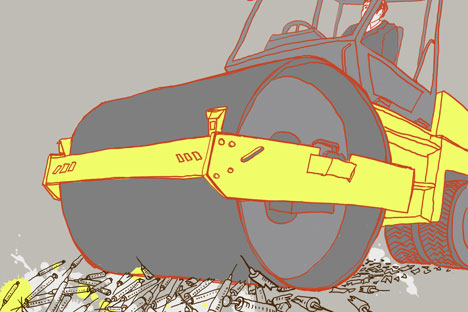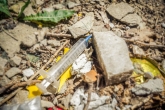State-run rehabilitation program needs more work

{***State-run rehabilitation programme needs more work***}
Click to enlarge the image. Drawing by Natalia Mikhaylenko
Read Alexander Delfinov's opinion on the next page
By Denis Avtonomov
On June 28, 2013, a project run by the State Interdepartmental Program (“Comprehensive Rehabilitation and Re-socialization of Consumers of Narcotic Drugs and Psychotropic Substances”) was presented. The Russian Federal Drug Control Service, which is a law enforcement agency, drafted the document and is responsible for the execution of the program.
The purpose of the state-run program is to reduce the demand for drugs, develop rehabilitation resources and provide access to social and rehabilitative care for all those who want to stop using drugs.
The following essential stages were highlighted in the project: prevention, early diagnosis and intervention, treatment and protection, rehabilitation, social integration, provision of additional services (including employment assistance, access to education, etc.).
According to the Federal Drug Control Service there are currently around 500 non-medical rehabilitation and re-socialization centers that have been created by nongovernmental organizations in the Russian Federation. Up to 20,000 drug addicts undergo rehabilitation in these centers annually.
According to the government project, “an establishment of necessary mechanisms and modalities for increasing the number of rehabilitated drug users to 150,000 people each year is required.”
It is assumed that the state will select and create a unified database of private rehabilitation centers and, by means of using a non-cash payment method, pay for rehabilitation services for every citizen of Russia who wants to get rid of his or her drug addiction. The program is scheduled to run in 2013–2020, with total funding at 179 billion rubles (nearly U.S. $ 5.5 billion).
On paper, it looks great — rehabilitation, care, employment, social services, etc. However, "the devil is in the details." To begin with, instead of the term “addict” (a person who has been diagnosed with substance abuse or drug addiction), the term “drug user" is predominantly used in the project and is not defined as a disease in the medical sense of the word. Only a minority of drug users have an addiction.
Nonetheless, according to the Federal Drug Control Service project, a person is supposed to be referred to rehabilitation even in the case of a single (!) use of a narcotic and psychotropic drug without a doctor's prescription. That is, a person who is not ill is supposed to be treated prematurely.
In general, the methodology of the project is based on the erroneous assumption that "drug users" and "drug addicts" are identical. Another miscalculation of the project’s developers is the belief that anyone who uses drugs will become addicted if not treated urgently.
The principle of anonymity is not even considered in this project. The fear of being recorded is the main reason addicts avoid substance abuse treatment in public hospitals and rehabilitation centers under the Russian Health Ministry.
A "data bank" is supposed to be created for all the individuals who use drugs. Being on the list can have serious consequences and become the basis for significant deprivations of rights for a citizen of the Russian Federation (including limitations concerning employment, use of weapons, driving vehicles, caring for and adopting children, etc.).
In general, the State Interdepartmental Program rehabilitation project is unreasonably expensive, creates preconditions for the creation of a narrow circle of their own rehabilitation centers, contains methodological errors and is contrary to the principles of medical ethics and validity.
Related:
Russia, U.S. sum up joint anti-drug campaign
Rehabilitation of addicts to cost Russia 25 bln rubles annually
Moscow anti-drug conference brings together police from over 100 countries
The project involves a more than seven-fold increase in rehabilitation resources (from the original 20,000 to 150,000), without providing any evidence-based assessment of the need for these resources to be used.
With all of these shortcomings in the program, the government must first conduct a thorough, evidence-based, representative estimate of the number of drug users in the Russian Federation (which has not yet been done), by type of psychoactive substance used, age, gender, employment status and frequency of drug use.
It is necessary to distinguish these individuals from those who meet the criteria of drug abuse and separate them from those who meet the criteria for drug dependence.
The lack of such baseline data does not allow for the assessment of the need for rehabilitation resources or implementation of a plan of expected performance. The development of the project should involve competent experts — primarily lawyers, psychologists and doctors, and not security forces — followed by an assessment carried out by the experts of leading specialized research institutes.
Denis Avtonomov is a medical psychologist and the head of a charitable Russian rehabilitation program ("No to Alcoholism and Drug Addiction”).
{***Russia at a loss on effective addict rehabilitation***}
Russia at a loss on effective addict rehabilitation
Government reform of drug rehabilitation shifts focus from treatment to enforcement
By Alexander Delfinov
Society views drug abuse as one of our country’s most urgent problems. The HIV epidemic continues to spread across Russia, even as it is retreating elsewhere in the world, even in Africa. The problem of drug-resistant tuberculosis has joined the mix since 2007.
From a purely medical standpoint, the government is really spending a lot of money to purchase antiretroviral drugs to support HIV patients, yet it totally ignores WHO-recommended measures to prevent the spread of HIV among injection drug users, such as needle exchange programs or replacement therapy.
Death from overdose is another real-world problem. A prevention system is used worldwide, in which Naloxone (a 100-percent opioid antidote) is distributed among drug addicts and social workers hold seminars on how to use it.
This is also part of non-medical drug use damage reduction programs; in Russia, however, the government does not support such programs, but merely tolerates them temporarily.
In May 2012, President Putin signed a decree on improving state healthcare policy, which envisages, among other things, reform of the drug addiction treatment service by January 1, 2016.
The conclusion to be drawn at the moment is that this work is clearly slanted in favor of repression and control practices, to the detriment of healthcare-related and scientifically proven ones.
Here is just one example. It is no secret that the removal of the abstinence syndrome — also known as withdrawal — is not the main challenge when treating drug addiction resulting from opiate injection. Subsequent rehabilitation involving protracted psychological and social work with the patient is much more difficult.
Our country has a whopping three (!) specialized rehabilitation centers for drug addicts. At the same time, according to Federal Drug Control Service head Gen. Ivanov, Russia is home to some 8 million users of controlled psychoactive substances, including 2.5 million injected drug users (bear in mind that relevant scientific studies in all 83 Russian regions do not corroborate the Ivanov’s opinion).
It is little wonder, then, that all kinds of non-state “rehabs” have been flourishing, such as Yevgeny Roizman’s notorious Drug-Free City or Andrei Charushnikov’s Russia’s Transfiguration (the latter having recently been convicted of killing a patient in Kemerovo).
Drug addicts are subjected to torture rather than treatment in such establishments. Yet, lo and behold: The Federal Drug Control Service could receive some 200 billion rubles ($6.1 billion) to establish... a national rehabilitation system.
Now how could narcotics cops, whose job is supposedly to bust drug traffickers, double as medics or psychologists? Here is how: The newly established “national system” started out by incorporating existing private rehabs, and even Roizman’s Drug-Free City has found its way onto the Federal Drug Control Service’s list of drug treatment centers.
Remarkably, Europe is going in a totally different direction, curtailing enforcement measures in favor of treatment and social counseling. Perhaps Russia lacks the financial resources needed for massive social aid? Granted, we are poorer — but apparently not poor enough to eschew the multi-billion spending on the Federal Drug Control Service’s “list of rehabs,” or on wholesale purchases of drug tests, which is another popular idea in “the war on drugs.”
The war on drugs posits that, if school-aged and college students are tested in a timely fashion for controlled substance use, the related problems might be averted. The Ministry of Health’s Yevgeny Bryun is among the enthusiastic proponents of this idea.
Alas, concern for patients’ well-being is hardly the driving force behind all this. What might be the results of drug testing? Indiscriminate testing does not envisage any follow-up medical or social work with problem children or teenagers. Any results can only be punitive: Identified users will be expelled from school and college, registered as drug addicts, etc.
Such measures will only increase the social stigmatization of drug users, who, to quote the narco-populist Roizman, are treated as animals, not humans, here. And what rights do animals have? None. They need to be detected and isolated.
Well, that is exactly what Roizman is doing, having set up a kind of semi-criminal, forced treatment system. Unfortunately, the state drug addiction treatment service has yet to provide Russia’s citizens with a viable alternative.
Alexander Delfinov is the co-founder and moderator of the Narcophobia project.
All rights reserved by Rossiyskaya Gazeta.
Subscribe
to our newsletter!
Get the week's best stories straight to your inbox



